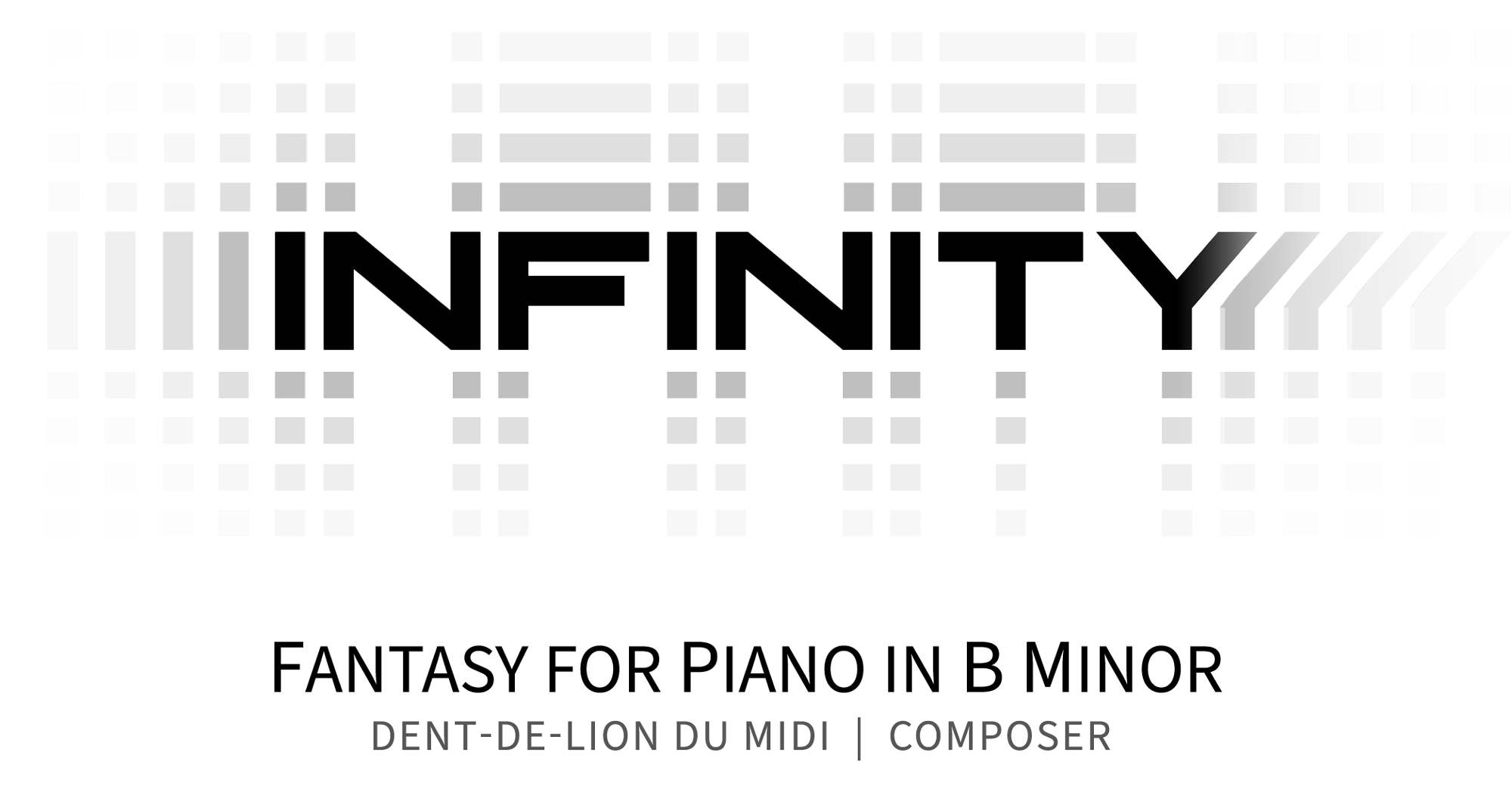CREATIVITY UNBOUNDED
“Some infinites are bigger than other infinites".
Georg Cantor, Mathematician
Infinity is a breathtaking work for solo piano that resonates with the ethereal essence of spacetime.
The music evokes the sublime beauty of pure Mathematica, transporting the listener to a realm of unbounded possibility. The equation
is an apt representation of the infinite nature of the composition, where each iteration builds upon the last. The virtuoso playing required for this work is nothing short of extraordinary, demanding precision, finesse, and a commanding mastery of the instrument.
The unique structure of Infinity is a testament to the boundless nature of the universe, gradually evolving over time, everchanging in complexity and intensity with each passing measure. The piece is clearly meant to be repeated, allowing the performer to explore the music's endless depths and nuances.
The final section of Infinity is particularly evocative, conjuring the imperishable cosmos with other worldly tonality. This passage conveys a sense of wonder and awe, inviting the listener to contemplate the vastness of the macrocosm, while reflecting on our extremely temporal place within it.
Infinity translates the essence of the universe through a rich and vibrant musical language. A composition which is truly a sound testament to the beauty and grandeur of the Infinite.
Notes About Music ~ Karl and Lise Hammerstein
NOTEWORTHY | THE NEW MUSIC JOURNAL
Infinity is a richly layered kaleidoscopic piano fantasy,
merging introspective lyricism with rigorous formal design,
requiring astonishing control, imagination, and virtuosity.
From its first moments in B minor, Infinity asserts itself as a composition of grand ambition. The opening motif, quietly insistent, spins outward into a tapestry of inner voices and counterpoint, and Dent-de-Lion orchestrates a series of modulations with subtle inevitability: minor → modal inflections → D major hints → fleeting excursions into G and E minor before the music inexorably returns, as though orbiting some conceptual center. These tonal shifts never jar; they feel like the slow curvature of space itself.
In its architectural logic, Infinity recalls Philip Glass’ meditative unfolding, though here every repetition is jewel-calibrated rather than mechanical. One hears the textural metamorphoses of Ligeti’s late piano works (especially his études) in the gradual accretion of complexity. The harmonic daring and coloristic hue evoke the mysticism in Scriabin — yet with greater restraint. One might also compare the atmospheric luxuriance of Ravel (especially in his later nocturnes) or the structural introspection of Alexander Zemlinsky’s piano miniatures, recast in a contemporary idiom.
To bring Infinity to life demands exceptional technical mastery. The pianist must maintain perfect hand independence — inner lines must breathe while outer layers shift. The dynamic gradations are micro-measured: pianissimo whispers that swell into midrange pulses without losing poise. Tone control is critical: fingers must coax clarity in dense polyphony, pedaling must be surgical to avoid clouding, and voicings must emerge like hidden architecture. Shaping long phrases over dozens of bars, with tonal pivots and volume curves, requires stamina and unflagging focus. Any lapse in concentration risks flattening the incessant spiral.
Performing Infinity live is formidable: sustaining momentum without momentum’s overt gesture, keeping lines transparent under pressure, and preserving the dramatic continuity across key changes and dynamic flux. The sheer difficulty of controlling texture, tone, and structure over extended spans makes this a tour de force for the concert pianist.
In terms of piano mastery level, I would place Infinity at Level 9 (on the standard 1-9 concert repertoire scale) — meaning only fully mature, world-class technique and interpretive insight suffice to render it convincingly.
The perfect challange for pianists looking to perform new works.
Carlos Eduardo Cienfuegos
Barcelona


